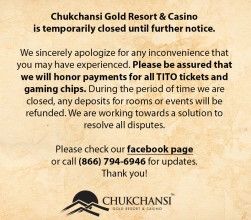CA deals Indian casino chaos
by James Poulos | November 27, 2014 6:29 am
 Despite generating huge revenues, California’s Indian casino industry has been dealt some questionable hands. Political interests have begun to swirl like a roulette ball around fresh efforts to legalize internet gambling statewide.
Despite generating huge revenues, California’s Indian casino industry has been dealt some questionable hands. Political interests have begun to swirl like a roulette ball around fresh efforts to legalize internet gambling statewide.
But voters have been confronted by unpopular plans to expand brick-and-mortar gaming. And customers in at least one high-profile instance have been confronted by an all-too-literal conflict within tribal casino owners.
Both cases have underscored a new reluctance among Californians to treat Indian gambling operations with the degree of generosity extended by Sacramento.
Earlier this month, voters rejected Proposition 48 — a measure designed[1] to approve the state’s legal authorization for a new, off-reservation casino.
AP reported[2] Gov. Jerry Brown signed off on the plan because it would have precluded putting the casino on “environmentally sensitive” locations in Humboldt County.
It would have allowed the North Fork Rancheria Band of Mono Indians to construct a massive, 2,000-slot building 40 miles away from its reservation. It lost, 61-39[3].
But according to AP,[4] Prop. 48 backers blamed “opponents — including wealthier tribes with competing gaming interests” that “had confused voters by construing the ballot measure as a referendum on the limits of gaming statewide instead of the one-tribe compact it was.”
Regardless, the tribe’s spokesman Charles Banks-Altekruse told AP the failure of Prop. 48 would simply lead to another deal at a later date. “What’s next is we’ll go back and get another agreement and we’ll build the casino with another compact,” he said.
The ordeal reflected a potentially rancorous political situation, where voters struggle against lawmakers — ultimately unsuccessfully — to impose limits on California gaming. According[5] to the Las Vegas Review-Journal, California’s Indian casinos generate nearly $7 billion in revenue per year, a figure that makes up a fourth of gaming totals nationwide.
Winners and losers
The combination of big money and government regulation that drives Indian gaming expansion well could turn voters who won the fight against Prop. 48 into losers.
According to Jeff Heiman, the Southern California managing director of Tribal Financial Advisors, the defeat of Prop. 48 actually works to the advantage of a troubled casino. The Chukchansi tribe, currently feuding over its Chukchansi Gold Resort and Casino in the town of Coarsegold, recently sent patrons fleeing as a former tribal leader staged[6] an armed raid of the property last month.
The shocking attack, however, was just the latest twist in a factional fight that closed Chukchansi last month. As Heiman suggested[7] to the Fresno Bee, the big financial interests with a large stake in Chukchansi and other Indian casinos will be more apt to work out a deal since Prop. 48 hasn’t put another massive gaming project on the table.
Now temporarily closed (the above image is of the front page of its website[8]), Chukchansi has cost the tribe millions in lost revenue — an especially large poker chip to swallow given the unfavorable terms the tribe had worked out with its creditors.
As the Bee noted, the tribe agreed in 2011 to restructure its debt at an interest rate of 9.75 percent.
In fact, the Bee reported, the October raid was launched to “recover financial records” about audited financial statements from the past two years. Because the audits were late, the National Indian Gaming Commission slapped Chukchansi with an order imposing the temporary closure.
As ABC reported[9], “Chukchansi’s financial losses are unclear because Indian casinos are not required to disclose earnings.”
Trickle-down benefits
The trouble faced by Chukchansi has exposed the way the economy surrounding Indian gambling often allocates revenues more to financial concerns than to tribal members.
Generating some $100 million a year, the Bee calculated, only about $12 million a year from the casino went to the Chukchansi tribe. The remainder was divided between bond payments, payroll and operating costs.
As a result, tribes face continued pressure to expand casino operations, especially into online gambling.
Robert Martin, chairman of the Morongo tribe, told the Review-Journal that as “tribes come together” on Internet betting, “the opportunity for success grows.”
Yet online gambling faces major high-stakes opposition not only in California, but nationally. Forbes [10]reported:
“Sheldon Adelson, the nation’s 11th richest person and chief executive of casino company Las Vegas Sands, says he is determined to stop online gambling in America and he will go to great lengths to battle the corporate interests pushing for it. ‘I am willing to spend whatever it takes,’ Adelson said in his first interview since The Washington Post revealed[11] that he had hired an army of lawyers and lobbyists to try to convince Congress to ban online gambling.”
As a Republican, Adelson will wield even more clout when the GOP takes over the U.S. Senate in January.
- designed: http://ballotpedia.org/California_Proposition_48,_Referendum_on_Indian_Gaming_Compacts_%282014%29
- reported: http://www.nbcsandiego.com/news/politics/California-Prop-48-Tribal-Gaming-Measure-Defeated-281604221.html
- 61-39: http://ballotpedia.org/California_Proposition_48,_Referendum_on_Indian_Gaming_Compacts_%282014%29
- according to AP,: http://www.pe.com/articles/measure-753482-prop-angeles.html
- According: http://www.reviewjournal.com/columns-blogs/inside-gaming/internet-poker-california-shapes-coveted-prize
- staged: http://abcnews.go.com/US/wireStory/california-indian-casinos-embroiled-turmoil-27102552
- suggested: http://www.fresnobee.com/2014/11/21/4253523/in-chukchansi-turmoil-financiers.html
- website: http://www.chukchansigold.com/
- reported: http://abcnews.go.com/US/wireStory/california-indian-casinos-embroiled-turmoil-27102552?singlePage=true
- Forbes : http://www.forbes.com/sites/nathanvardi/2013/11/22/sheldon-adelson-says-he-is-willing-to-spend-whatever-it-takes-to-stop-online-gambling/
- The Washington Post revealed: http://www.washingtonpost.com/politics/sheldon-adelson-top-2012-donor-launching-campaign-against-internet-gambling/2013/11/17/d70054f6-4e40-11e3-be6b-d3d28122e6d4_story.html
Source URL: https://calwatchdog.com/2014/11/27/ca-deals-indian-casino-chaos/